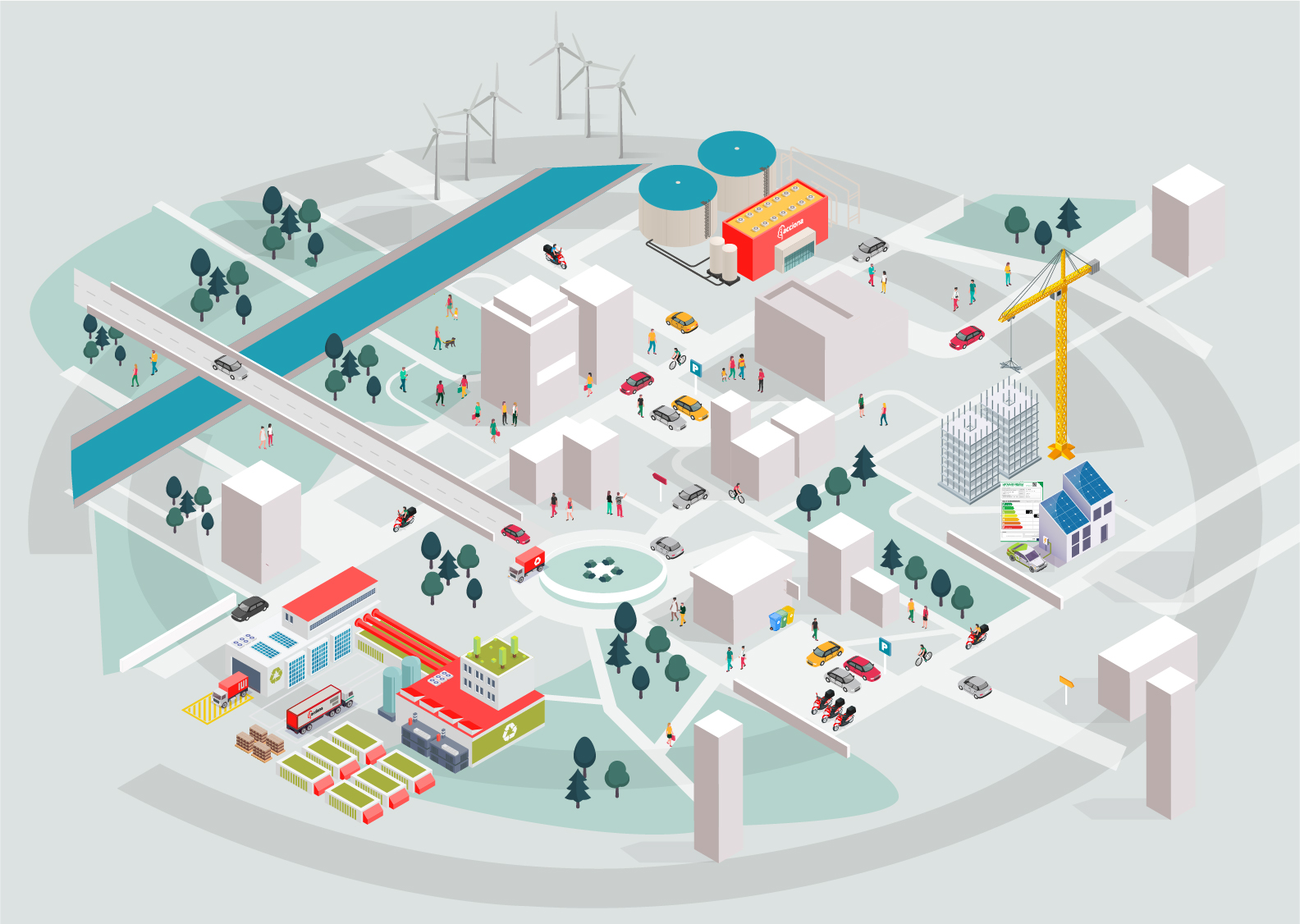-
And no, it's not a misprint. We don't want a 180-degree turn. The purpose of this article is not to turn our backs on the problem or turn the situation around, but to connect life in cities in a continuous cycle.
-
Life is cyclical. You only need look out of the window to see how the tree that shed its leaves in winter is coming into leaf again as the cold recedes and spring springs again.
Life is cyclical, sometimes perfectly so, as is the case with water. Each drop is in constant movement, across and around the Earth, continuously changing from liquid, to vapour, to ice. Ever-changing, ever-returning to the source.
It is cyclical like time, where 60 minutes always make an hour. And it is cyclical like nature which has an immense ability to regenerate, adapt and function as its environment changes. What if we were able to emulate it?
Human beings are the only inhabitants of the planet who generate waste. In Europe alone, each citizen produces more than 620 kilos of waste a year. Our economic system—which revolves around buying, using and throwing away—is the cause of half of all environmental issues. These issues are a consequence of the linear economy.
Now is the time to act. We cannot ignore what is happening, we have to tackle the problem. It is imperative that we don't let time pass us by. We need to take the reins and ensure the continuity of Earth's life cycle.
-
Half of the human population lives in cities, the world's main hubs for social and economic progress. However, overpopulation and the climate emergency are making it necessary to rethink these spaces.
The pressing need to equip cities with the necessary means to tackle the planet's major challenges, such as climate change and urban concentration, is what compels ACCIONA to design essential urban services beyond energy and water. Interconnected solutions that transform cities into truly productive and habitable spaces of well-being.
The company addresses waste management and the circular economy, expands electric and shared mobility, regenerates urban space efficiently and increases green space. It is what has been coined as ACCIONA's Circular City, a model of transformation that will make urban spaces sustainable, intelligent and inclusive, fostering the design of a better planet.
Want to know more about this model? See how it works in the following gallery.
-
Circular cities, Waste-free cities
As 2 billion tonnes of waste is generated worldwide every year, Europe has set itself the ambitious target of recycling 65 % of all waste by 2030, in addition to encouraging composting. But there is still much to be done.
Reducing, reusing and recycling are the pillars of the cities that ACCIONA wants to design. These are key factors in preventing the collapse of human productivity and addressing the climate emergency.
In order to transform cities, waste management must be addressed. Our proposed solutions for this seek to accelerate the implementation of a circular economy model that focusses on taking care of the resources used and how they are produced.
For this, ACCIONA offers services that include waste collection, road cleaning, maintenance of municipal spaces, beaches and urban developments, management of waste treatment and transfer plants, as well as management of the waste disposal centres of waste transfer plants.
Technology and innovation are key to this. The progress we have made means we have successfully increased the efficiency of waste collection, transport and management. In this way, ACCIONA designs optimised routes, uses container sensorisation and obtains new sustainable materials.
-

-
Waste to Energy, energy from cannot be recycled
In addition, the company is able to turn difficult-to-recycle waste into renewable energy using Waste to Energy plants. ACCIONA has three of these plants, which eliminate up to 850,000 tonnes of urban waste per year and produce up to 619 MWh of clean electricity.
Some of the organic waste that arrives can be used to generate biofuels and, then, along with the rest of the materials, a thermal treatment is normally applied, using cutting-edge technology to produce minimal emissions. The heat generated produces steam that drives a turbine to generate electricity. Finally, the waste from this process is used to manufacture recycled materials.
Waste-to-energy plants are one of the best options for non-recyclable waste. Although, the challenge of the future is to design sustainable products so that, one day, even these plants will not be needed.
-
Designing a better world also means designing better cities
The traditional linear model for production management has proven inefficient. Moreover, it has become one of the causes of environmental degradation and global warming.
The circular model follows the example of nature, where nothing is wasted and everything is reused. We want to connect life in cities in a continuous cycle in order to preserve life in the face of the threat of climate change.
Utilising resources, promoting the well-being of people, taking care of the environment… The circular model seeks to reinvest in the planet, ensuring that the wheel of life never stops turning.
-
-
Guardians of an ancient treasure
Could the legend of the Arab sultan who hid a priceless treasure in Almeria be true? Discover ACCIONA’s best kept secret
-
-
-
-





